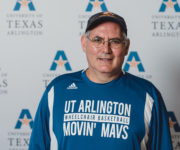Meet the Match
Kosovo Disability Sport Leader Builds for the Future
Entering class on the first day of school in Pristina, Rinor Gashi was in the unique position of being one of the first students with a visible disability in his village. As a 6-year-old escaping with his family during the Kosovo War, he experienced spinal injury due to a grenade attack and returned home from rehabilitation in Germany as a wheelchair user. His classmates, unaccustomed to seeing someone in a wheelchair, asked him, “Why can’t you walk like us, Rinor?”
While it was challenge being only student with a disability in his school, Rinor was encouraged by his family to remain active. Eventually, sport became an escape, as his brother often invited him to play soccer, modifying the game so that everyone could participate.
“I played in my wheelchair and I would shoot at the goal with my hand just to take part,” Rinor recalls. “My brother and his friends found a way to include me, and that meant a lot. I was just a normal boy like everyone else.”
Through his teenage years, Rinor practiced athletics, tennis, scuba diving, and swimming. But he fell in love with was wheelchair basketball. At 12 years old, he started visiting local clubs to play, and even though he didn’t play a lot, he set new goals to keep getting better.
“In the beginning, I couldn’t reach the basket with my shot,” Rinor says. “But, by the second year I could reach it. The first time I scored it felt like the best moment ever. I unlocked a new power—it was very exciting.”
After finishing secondary school, Rinor became involved as a leader within Kosovo’s disability sport movement. Since 2012, he has organized yearly events for wheelchair users, including the Active Rehabilitation Camp in neighboring Albania, the Kosovo National Wheelchair Basketball Tournament, Halit Ferizi Memorial Wheelchair Basketball Tournament, and the International Day of People with Disabilities Tournament. In addition to these events, he serves as program coordinator for the NGO HandiKos, an advocacy organization that runs several projects serving the disability community.
“Our organization has branches in all the provinces of Kosovo,” Rinor says. “We have 18,000 people with physical disabilities in our network. We launch projects to cover the gaps left after government support and a lack of other health and social services.”
Based on USAID estimates, as many as 200,000 people in Kosovo have a disability. Despite this number, most facilities, transportation services, and schools remain inaccessible to them. Through the work of government and NGO’s like HandiKos, employment opportunities are growing. For people with spinal cord injuries or cerebral palsy, however, the country has a severe lack of rehab centers..
Rinor believes that sport can help close health and wellness gaps, as well as provide vital benefits to people with disabilities: increased self-confidence, a change in societal stereotypes, and newly-formed bridges between people with and without disabilities.
With his expertise in the basketball sector, Rinor is working to create a sustainable national wheelchair basketball league and federation. Currently, six wheelchair basketball clubs are established in Kosovo. Without a league, the teams only play when Rinor and HandiKos organize tournaments, sometimes leaving players without competition for up to five months. After Kosovo’s national basketball federation was accepted by FIBA in 2015, Rinor believed the logical next step was the creation of a wheelchair basketball federation.
“Creating the federation will be important for organizing and uniting the wheelchair basketball community in Kosovo,” Rinor says. “This is my personal and professional dream—that is why I’m willing to give everything to achieve it. More people with disabilities playing sport gives us a more active role in society, and changes stereotypes. I am the proof this can happen.”
During the program, Rinor was mentored by one of the United States’ key leaders in collegiate and youth wheelchair basketball. A recognized disability sport advocate who was honored as a Champion of Change by the White House, Doug Garner serves as head coach of the University of Texas-Arlington men’s wheelchair basketball team as well as commissioner of the National Wheelchair Basketball Association (NWBA) Junior Division. With expertise in event organization, and experience collaborating with the national basketball federation, Doug has led grassroots efforts to engage the community to participate in and support disability sport. Doug and UT-Arlington served as vital resources for Rinor as he strives for a sustainable and functional culture of wheelchair basketball in Kosovo.

